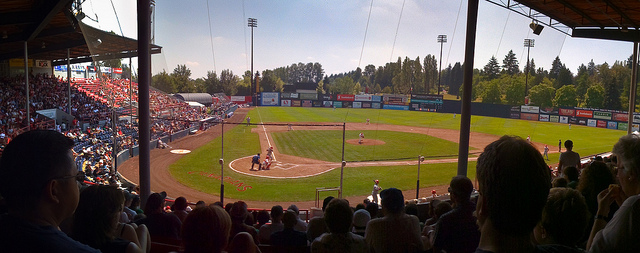Our interview with UVic alumnus and Vancouver Canadians GM JC Fraser
For JC Fraser, an ex-Scuba diving instructor and UVic French History major, his journey into the sports business industry is a story that would likely would come out of a Hollywood filmmaker’s script.
From applying to be a Vancouver Canadians summer intern because “it looked like a cool summer job” 12 years ago, to establishing the C’s as one of the premier minor league baseball teams in North America, Fraser has come a long way in his 12 years with the Canadians.
Now he boasts a resume that includes winning four Northwest League titles since 2011, earning the 2015 Northwest League Executive of the Year, and being named to the Top 40 under 40 list by Business in Vancouver Magazine. Fraser has reinvigorated a franchise that relocated in the early 2000’s after an American businessman bought and moved the team south of the border, but returned to become a summer staple in Vancouver today.
Now entering his sixth season atop the helm as the GM of the Vancouver Canadians, a short-season, Single-A affiliate of the Toronto Blue Jays, UVic alumnus JC Fraser has played a key role in making the Canadians one of the most prominent minor league teams in baseball — not only in Canada, but in the United States as well.
Canadians game attendance was at an all-time-high last season, as the club welcomed 239 527 fans through the gates at the 6 413-seat Scotiabank Field at Nat Bailey Stadium on the mainland, good enough for a 6 303 per-game average and a 98.3 per cent total capacity rate.
The rise in popularity is a far cry from nearly 20 years ago, when the Triple A version of the Canadians—the highest level of professional baseball before the Major Leagues—moved to Sacramento and was renamed the River Cats.
In his five-year reign as general manager, Fraser has played a key role in expanding the stadium’s capacity with a brand-new deck in left field; the team also led the eight-team Northwest League in average attendance in four of those five years.
For those who may not be as familiar with the logistics of MLB’s minor league tier system, all major league teams own minor league affiliates in three different tiers of baseball. They will then ship their prospects down to the minor league level to develop, in hopes they hone their skills to a major league level before reaching the big club.
Players will typically start in Single-A — the league in which the Canadians currently play — then develop and wait for the call to Double-A, Triple-A, and finally the MLB.
Even when the Canadians were reborn in Vancouver one year after the Triple-A team left to Sacramento in 2000, they struggled to attract fans to games, averaging only 3,260 seats sold per game in 2006.
However, the Toronto Blue Jays purchased the Canadians from the Oakland Athletics in late 2010, and with the help of Canada’s only MLB team and some savvy business decisions, Nat Bailey Stadium has seen a dramatic increase in attendance.
Fraser and the C’s front office staff credit a shift in attitude as the biggest reason for the Canadians’ success. Rather than simply watching a baseball game, Canadians fans can look forward to various themed activities and promotions to make their trip to the ballpark more of an event.
From mascot-themed sushi races between innings, a dancing grounds crew, and massive three-foot-long hot dogs, most fans come for a nice summer day outing rather than a baseball game against the Everett AquaSox.
In his five-year reign as general manager, Fraser has played a key role in expanding the stadium’s capacity with a brand-new deck in left field; the team also led the eight-team Northwest League in average attendance in four of those five years.
We interviewed Fraser, who took time out of his busy schedule to recap how he got to where he is today, and to give advice for aspiring students who want to become the next big-league general manager.
Josh Kozelj: Growing up, did you always envision yourself to be involved in sports business industry somehow?
JC Fraser: No. Growing up I went to school, went to UVic, I taught scuba diving for a while, I ran painting franchises. Just basically doing jobs that everyone else does growing up. I never actually thought I was going to land here. The reason why I landed here was after I came back from travelling for a year and a half, I was looking for work, and this honestly looked to me like a cool summer job.
JK: Did you play baseball or other sports in your childhood?
JC: Not well! I was alright at baseball, I played it just like every other kid growing up. I advanced much further in sports like tennis, soccer, rugby. But I love baseball, love watching baseball, I love the principles of baseball. I think baseball is one of the best sports in the world to watch, one of the best sports in the world to teach your kids about fairness and about failure. But I was never a star baseball athlete. Far from it! Whenever we go out and play with the staff I try to hold my own, but [I usually] fake an injury to get out.
You got to come in and grind. No one works in this industry for the money.
JK: What are some of the proudest achievements you’ve had, on or off the field, with the Canadians?
JC: There’s a lot of stuff that should be my proudest: scaling this business as much as it’s been scaled since I started here, building the new expansion over in left field which I had a big hand on, and that was something I’m pretty proud of. But even just the early stuff, like painting the seats — that was a really fun summer. We started in May and over the course of a month, we numbered 5 000 seats, every single one I drilled a nameplate in, and that sounds pretty silly but that changes the face of this ballpark forever.
JK: What advice would you give aspiring students looking to become general managers of their own, and enter the sports business industry?
JC: Just be prepared to grind. I may make the argument that media, movies, and what kids read and do gives them an inflated sense that you can just come in here and in two years be the general manager, make the same money your parents are making, and, you know, be laughing. “Three, four years with the parent team, five, six years moving up the ranks, be on a ten-year plan, and I’ll be the GM of the Toronto Blue Jays.” That’s totally the wrong attitude to go and look at it. You got to come in and grind. No one works in this industry for the money.









